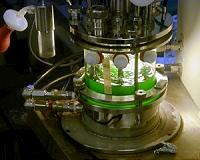 |
Mountain View CA (SPX) Nov 04, 2010 Cobalt Technologies has announced the signature of a Cooperative Research and Development Agreement (CRADA) with the U.S. Navy to develop technology for the conversion of biobutanol into full performance jet and diesel fuels. Under the CRADA, n-biobutanol produced by Cobalt will be converted to bio-jet and biodiesel fuels using technology developed at the U.S. Naval Air Warfare Center Weapons Division (NAWCWD) in China Lake, CA. The result will be a complete substitute for military and civilian jet fuel, meeting all applicable specifications. In addition, Cobalt will have an option to obtain an exclusive license to commercialize process improvements, made under the CRADA, for the production of all military and civilian transportation fuels. "We are pleased to collaborate with the U.S. Navy to develop a renewable option for jet fuels," said Rick Wilson, CEO of Cobalt Technologies. "It's exciting to be part of this research, which will help relieve our reliance on foreign oil through the use of renewable fuels developed here in the United States. With our front end for producing renewable n-butanol and the NAWCWD's technology for converting n-butanol into jet fuel, we can offer a complete process that directly addresses the military's green fuels mandate." "It is a privilege for NAWCWD chemists to work in partnership with Cobalt Technologies on this exciting technological venture," said Dr. Michael D. Seltzer, head of NAWCWD's Technology Transfer Program. "Anytime we can support the fleet and at the same time transfer important technology to the private sector, it is a win-win situation. As NAWCWD continues its leadership role within DoD in the research and development of alternative fuels, opportunities such as this are greatly valued." The U.S. Navy has set a high priority on the development of cost-effective and sustainable domestic sources of fuels and has several initiatives in place to increase its use of biofuels, while decreasing its carbon-footprint and dependence on foreign petroleum. By collaborating with the Navy scientists who have expertise in converting biobutanol to bio-jet and biodiesel fuels, Cobalt Technologies is well positioned to demonstrate and implement a large-scale process for generating sustainable and renewable fuel for both military and commercial use.
CRADA Research Details More specifically, the combined team will optimize dehydration chemistry for the conversion of bio-n-butanol to 1-butene, followed by oligomerization of the biobutene into jet fuel, based on a process developed at NAWCWD. Additional work will focus on converting the biobutanol into butyl ether, which the NAWCWD has shown can be mixed with n-butanol and other compounds to create a viable drop-in diesel fuel replacement. This CRADA with Cobalt Technologies is made possible by the U.S. Federal Technology Transfer Act of 1986, which allows private organizations to access the expertise, capabilities and technologies of U.S. Federal laboratories to improve the economic, environmental and social well-being of the United States.
Share This Article With Planet Earth
Related Links Cobalt Technologies Bio Fuel Technology and Application News
 Algae-Based Biofuels Annual Production To Reach 61 Million Gallons By 2020
Algae-Based Biofuels Annual Production To Reach 61 Million Gallons By 2020Boulder CO (SPX) Nov 04, 2010 In the face of petroleum scarcity, increasing oil prices, market volatility, and climate change, leaders in government and industry are looking to renewable fuel sources such as algae-based biofuels to reduce expenses and mitigate their acute vulnerability to petroleum supply chains. Yielding 2 to 20 times more oil per acre than leading oilseed crops, algae's productivity and scalability a ... read more |
|
| The content herein, unless otherwise known to be public domain, are Copyright 1995-2010 - SpaceDaily. AFP and UPI Wire Stories are copyright Agence France-Presse and United Press International. ESA Portal Reports are copyright European Space Agency. All NASA sourced material is public domain. Additional copyrights may apply in whole or part to other bona fide parties. Advertising does not imply endorsement,agreement or approval of any opinions, statements or information provided by SpaceDaily on any Web page published or hosted by SpaceDaily. Privacy Statement |